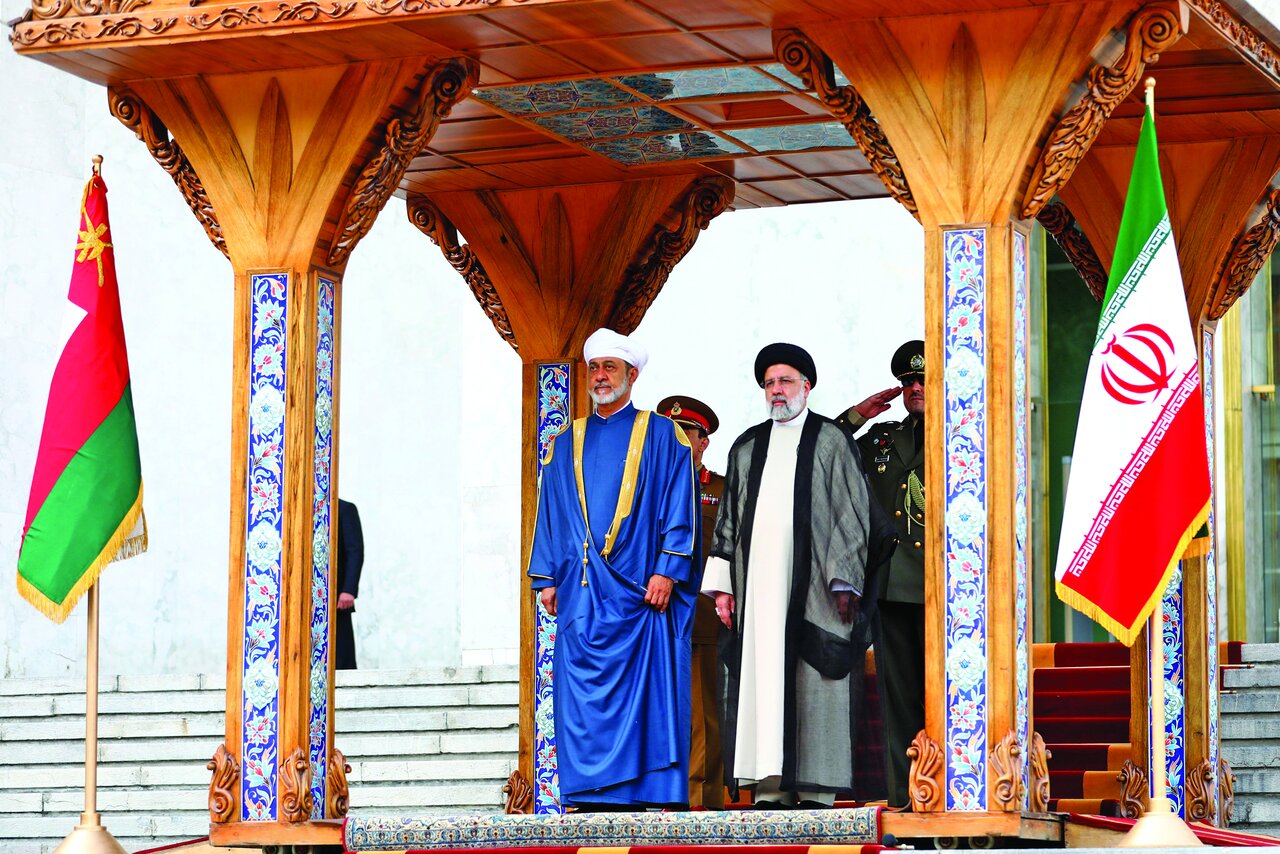The messages of Sultan’s journey

TEHRAN – Sultan Haitham bin Tarik of Oman arrived in the Iranian capital on Sunday afternoon for a two-day visit during which many bilateral, regional and international issues were expected to be discussed.
Upon his arrival at Tehran’s Mehrabad Airport, Sultan Haitham was received by Mohammad Mokhber, the vice president of Iran. The Sultan of Oman is leading a politico-economic delegation that includes many economic, political, and military officials.
He was accorded an official reception at the Sa’d Abad Palace, where the national anthems of Iran and Oman were played.
In Tehran, the Sultan of Oman holds high-level meetings, discussing a variety of issues. Oman flexed its diplomatic muscles by securing prisoners swap deal between Iran and Belgium on the eve of Sultan Haitham’s trip.
The deal resulted in the release of Iranian diplomat Assadollah Assadi and Belgian prisoner Olivier Vandecasteele via Oman.
But the swap deal maybe just a showcase of what could be on the agenda of Sultan Haitham in Tehran. Before visiting Iran, the Sultan paid a trip to Egypt which was accompanied by media reports of Oman potentially mediating between Tehran and Cairo with the aim of patching up their diplomatic relations.
Iran and Egypt have already held secret talks in Baghdad. And they are expected to continue the talks.
In addition, Oman has been at the center of ongoing talks over Iran’s frozen assets in Iraq. A few days ago, Iranian Foreign Minister Hossein Amir Abdollahian spoke over the phone with his Omani and Iraqi counterparts.
The Iranian foreign ministry said Amir Abdollahian and Iraqi Foreign Minister Fuad Hussein discussed financial issues, among other things. It said during his conversation with Omani Foreign Minister Sayyid Badr Albusaidi, Amir Abdollahian described the visit of Sultan Haitham to Iran as “highly significant.”
It’s unclear if these conversations had something to do with releasing Iran’s frozen funds and the 2015 Iran nuclear deal, officially called the Joint Comprehensive Plan of Action (JCPOA). The Iraqi foreign ministry said in a statement that Amir Abdollahian thanked the Iraqi government for finding a solution to the transfer of money with the Americans.
But after these conversations, the Iraqi foreign minister called his Omani counterpart to discuss the Iranian funds. It said Hussein and Albusaidi discussed the financial problems between Iran and the U.S., particularly with respect to Iranian funds in Iraqi banks.
This could be an indication that Oman is doing something between Iran and the U.S. Perhaps they are resuming their mediation between the two sides at a time when differences over Iran’s nuclear program have reached a critical point where the U.S. can neither ignore Iran nor make a deal with it.
So, it is likely that the U.S. has resorted to Oman in order to find a band-aid solution before things get out of hand on the eve of the upcoming U.S. elections. If true, this runs deeply counter to U.S. allegations that the JCPOA is no longer on their agenda.
Iranian Ambassador to Oman Ali Najafi did not rule out that Sultan Haitham could be conveying a message from the U.S. to Iran. Responding to a question in this regard, he told Tasnim, “Oman has always played an effective and positive role in matters related to the foreign policy of the Islamic Republic. We have always appreciated the benevolent and positive actions of the Sultanate of Oman.”
Aside from the never-ending JCPOA developments, the visit of Sultan Haitham is also important in terms of bilateral and regional matters.
Regionally, Oman has been involved in many Iran-Arab talks. It facilitated the Chinese-brokered deal between Riyadh and Tehran, which was signed on March 10 in Beijing. Although Iran and Saudi Arabia appear to have resumed relations, Oman’s mediatory in this regard is far from being over. The deal needs assiduous follow-up and intensive care, hence the importance of Oman’s role.
The Omani foreign minister said the Sultan’s visit to Iran will positively impact the region. In remarks to Asharq Al-Awsat, he pointed out that the region is embarking on a new positive phase in regional relations.
Cooperation and consultations must be deepened in several files and issues to consolidate the new phase, which will no doubt be at the heart of discussions between the leaders, he remarked.
He noted that Oman and Iran enjoy historic fraternal relations based on firm principles of trust and mutual respect. The visit stems from the importance the leaderships of both countries place on cooperation and consultations on various regional and international issues.
“In Oman, we are hoping that this historic visit will reflect positively on the stability and security of the region and on relations between the region’s neighbors,” Albusaidi noted.
“We will work on ensuring that its outcomes will be felt on the regional and international levels,” he continued.
